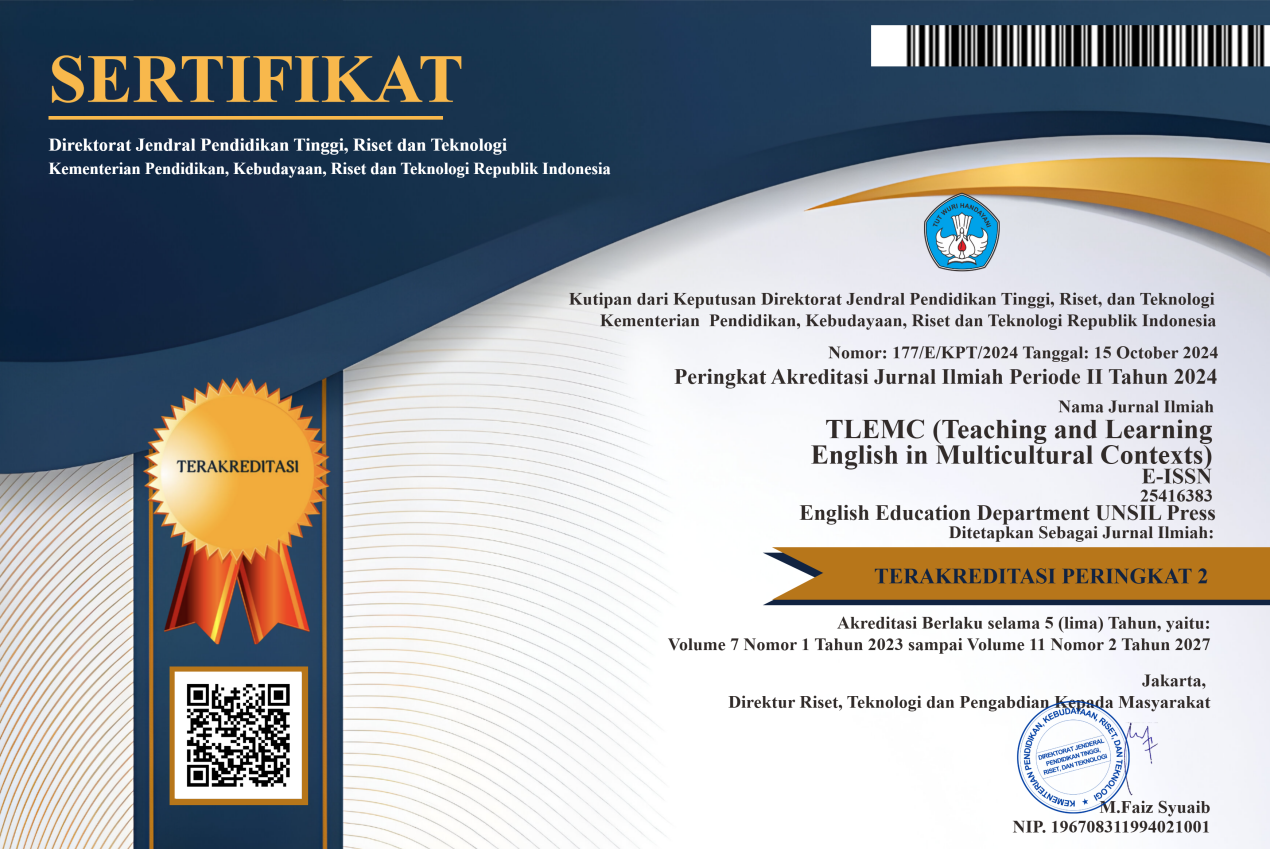INVESTIGATING COLLABORATIVE RESEARCH PROJECT IN INDONESIAN UNDERGRADUATE PROGRAM: BENEFITS AND CONCERNS
Abstract
Learning to research might become a challenge for undergraduate students since it needs navigating skills on how they look and relook the current trends in particular area globally. Although this study is not a new endeavor in ELT contexts, there remains lack of empirical evidence how it was experienced by undergraduate students in an Indonesian EFL context during a collaborative research project. In response to this, this study aims to explore how the students’ learning experiences in conducting this collaborative project (e.g., researching and reporting the research project). Framed in exploratory case study the data is collected through a survey given to 107 student teachers and in-depth semi structured interview to four student teachers in an English education department which were then thematically analyzed. Finding and implications of the study are provided further in this paper.
Full Text:
PDFReferences
Blumenfeld, P. C., (2011). Motivating Project-Based Learning: Sustaining the Doing, Supporting the Learning. Educational Psychologist, 369-398.
Blumenreich, M., & Falk, B. (2006). Trying on a new pair of shoes: Urban teacher–learners conduct research and construct knowledge in their own classrooms. Teaching and Teacher Education, 22(7), 864-873.
Braun, V., & Clarke, V. (2006). Using Thematic Analysis in Psychology. Qualitative Research in Psychology, 77-101.
Burke, L.A., & Cummins, M.K. (2010). Using Undergraduate Student-Faculty Collaborative Research Projects to Personalize Teaching. College Teaching, 4 (50), 129-133.
Carney, N., & Foss, P. (2008). Student-Produced Video: Two Approaches. English Teaching Forum, 14-19.
Chan, C. K. Y. (2012). Exploring An Experiential Learning Project through Kolb’s Learning Theory Using a Qualitative Research Method. European Journal of Engineering Education, 37 (4), 407-415.
Fernsten, L. A., & Reda, M. (2011). Helping students meet the challenges of academic writing. Teaching in Higher Education, 16(2), 171-182.
Fung, Y.M. (2014). Collaborative writing features. RELC Journal. 41(1), 18-30.
Grant, M. M. (2002). Getting A Grip on Project-Based Learning: Theory, Cases and Recommendations. A Middle School Computer Technologies Journal, 1-17.
Hood, M. (2009). Case Study. Qualitative Research in Applied Linguistics: A Practical Introduction, 70.
Kolb, D. A. (1981). “Learning Styles and Disciplinary Differences.†In The Modern American College: Responding to the New Realities of Diverse Students and a Changing Society, edited by A. W. Chickering, 232–255. San Francisco: Jossey-Bass.
Kolb, D. A. (1984). Experiential Learning: Experience as the Source of Learning and Development. Upper Saddle: Prentice-Hall.
Krajcik, J. S., & Blumenfeld, P. (2005). Project-Based Learning. The Cambridge Handbook of the Learning Sciences, 317-333.
Lantolf, J. P., & Thorne, S. L. (2006). Sociocultural Theory and Second Language Learning. In J. P. Lantolf, & S. L. Thorne, Sociocultural Theory and the Genesis of Second Language Development (pp. 197-221). Oxford: Oxford University Press.
Lin, O. P., & Maarof, N. (2013). Collaborative Writing in Summary Writing: Student Perceptions and Problems. Elsevier, 599 – 606.
Lysaker, J., & Thompson, B. (2013). Teacher research as a practical tool for learning to teach. Language Arts, 90(3), 181-191.
Mali, Y. C. (2016). Project-Based Learning in Indonesian EFL Classrooms: from Theory to Practice. Indonesian Journal of English Education, 89-105.
Panhwar, A. H., Ansari, K., & Ansari, S. (2016). Sociocultural Theory and its Role in the Development of Language Pedagogy. Australian International Academic Centre, Australia, 183-188.
Robbins, J. (2005). Contexts, Collaboration, and Cultural Tools: A Sociocultural Perspective on Researching Children’s Thinking. Contemporary Issues in Early Childhood, 140-147.
Sanmugam, S. T., & Rajanthran, N. (2014). Exploring Malaysian Polytechnic Lecturers’ Perceptions towards Research: An Institutional Case Study. TTLC 2013 (pp. 398 – 405). Malaysia: Elsevier.
Shirvan, M. E., Karahan, P., Ahangar, A., & Taherian, T. (2016). Towards an Ecological Understanding of University Students' Anxiety in English as a General Course in Light of Sociocultural Perspective. Elsevier, 62-69.
Struyven, K., Dochy, F., & Janssens, S. (2002). Students’ Perceptions about Assessment in Higher Education: a Review. Centre for Research on Teacher and Higher Education, 1-36.
Torres, V., & RodrÃguez, G. (2017). Increasing EFL Learners’ Oral Production at a Public School Through Project-Based Learning. Teachers’ Professional Development, 57-71.
Wallwork, A. (2016). English for writing research papers. Springer: New York.
Widodo, H. P. (2013). Doing Qualitative Research: A Step-by-Step Guide for Undergraduate Students. Discipline of Linguistics, University of Adelaide, 1-25.
Widodo, H. P. (2016). Engaging Young Learners of English in a Genre-Based Digital Storytelling Project. Cambridge: Cambridge University Press.
DOI: https://doi.org/10.37058/tlemc.v3i2.1268
Refbacks
- There are currently no refbacks.
INDEXED BY:
This work is licensed under a Creative Commons Attribution-NonCommercial-ShareAlike 4.0 International License.
![]()
TLEMC (Teaching and Learning English in Multicultural Contexts)
Program Studi Pendidikan Bahasa Inggris
Fakultas Keguruan dan Ilmu Pendidikan
Universitas Siliwangi
Jl. Siliwangi No. 24 Kota Tasikmalaya - 46115
email: tlemc@unsil.ac.id





